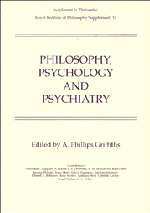Book contents
- Frontmatter
- Contents
- Preface
- Introduction: Just Getting Started
- Mind and Madness: New Directions in the Philosophy of Psychiatry
- Emotion and Memory: The Second Cognitive Revolution
- Meaning and Mechanism in Psychotherapy and General Psychiatry
- Making Sense on the Boundaries: On Moving Between Philosophy and Psychotherapy
- Mental Disorder, Illness and Biological Disfunction
- Integrity, Boundary and the Ecology of Personal Processes
- Multiple Personality and Computational Models
- Psychology and Politics: Lies, Damned Lies and Self-Deception
- Personal Identity and Psychiatric Illness
- Vices and the Self
- Wild Beasts and Idle Humours: Legal Insanity and the Finding of Fault
- Dangerousness and Mental Disorder
- Problems with the Doctrine of Consent
- Homosexuality
- Nietzsche and Music
- References
- Notes on Contributors
Multiple Personality and Computational Models
Published online by Cambridge University Press: 03 May 2011
- Frontmatter
- Contents
- Preface
- Introduction: Just Getting Started
- Mind and Madness: New Directions in the Philosophy of Psychiatry
- Emotion and Memory: The Second Cognitive Revolution
- Meaning and Mechanism in Psychotherapy and General Psychiatry
- Making Sense on the Boundaries: On Moving Between Philosophy and Psychotherapy
- Mental Disorder, Illness and Biological Disfunction
- Integrity, Boundary and the Ecology of Personal Processes
- Multiple Personality and Computational Models
- Psychology and Politics: Lies, Damned Lies and Self-Deception
- Personal Identity and Psychiatric Illness
- Vices and the Self
- Wild Beasts and Idle Humours: Legal Insanity and the Finding of Fault
- Dangerousness and Mental Disorder
- Problems with the Doctrine of Consent
- Homosexuality
- Nietzsche and Music
- References
- Notes on Contributors
Summary
Some readers may have seen the re-runs, on BBC-TV recently, of the ‘Face to Face’ interviews done by John Freeman in the 1960s. One of these was with the singer Adam Faith, then a startlingly beautiful young man with the grace to be amazed at being chosen to be sandwiched between Martin Luther King and (if I remember aright) J. K. Galbraith. The re-runs were accompanied, where possible, with a further interview with the same person. What I found almost as startling as his lost beauty was Faith's referring to himself-when-young in the third person. After watching the rerun interview, the now middle-aged man commented to Freeman, on several occasions, that ‘He said such-and-such’, ‘He told you so-and-so’, and the like.
This curious self-distancing was presumably based partly in a lack of memory. It would be amazing if one remembered much of what one had said in an interview twenty-five years ago, and Faith clearly did not. But cognitive—emotional distancing may have been involved, too. On a couple of occasions, Faith remarked either that he disagreed with what ‘he’ had said then, or that he could not fathom why ‘he’ had said it. The marked physical differences between the younger and older personae, and their very different life-styles, may have contributed also.
- Type
- Chapter
- Information
- Philosophy, Psychology and Psychiatry , pp. 103 - 114Publisher: Cambridge University PressPrint publication year: 1995



